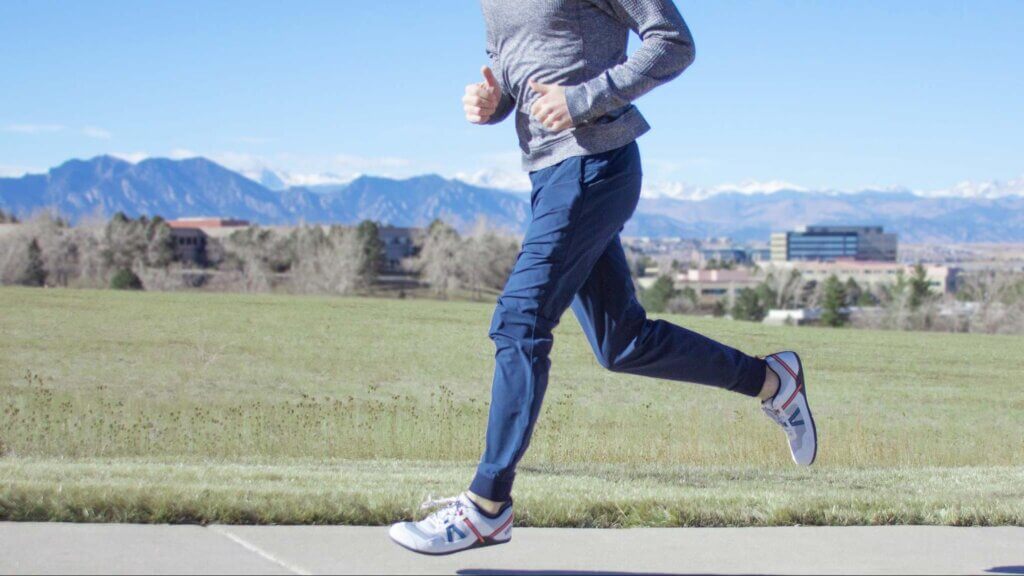
The benefits of running go far beyond physical health; Running can have a profound impact on our mental health and well-being. In fact, some avid runners may go as far to say “running is like free therapy”.
We all hit challenges, setbacks, or losses in our lives. When these challenges occur, many turn to running as a way to work through them.
In this article, you’ll discover the effects of running for mental health, and learn about a few organizations that use the power of running to make a difference in the lives of others.
Mental Health Effects of Running
Like many forms of physical exercise, running can be used as a way to control stress and boost the body’s ability to deal with mental tension. Here are a few effects of running that can be used to improve mental health.
Reduce Anxiety and Depression
Seeking professional help is always a good idea for treating depression and anxiety, however, increasing exercise is an additional step to help reduce symptoms. For those who feel anxious or struggle with depression, running can be an impactful way to help manage symptoms.
Here are some of the mental health benefits running can provide:
- Going on a run releases pent-up physical and mental tension. This offers a cathartic outlet for anxiety built up throughout the day. The rhythmic motion and cardiovascular exertion help to loosen the grip of tension in the body, allowing you to feel calm and relaxed.
- Your body releases hormones called endorphins during a long run. Endorphins boost the release of dopamine, which act as mood enhancers.
- Anxiety and depression often disrupt sleep, leaving individuals feeling fatigued and depleted. Running can help to improve the quality of sleep, leading to a more stable emotional state.
- In a study done on adolescent girls, running was shown to boost their sense of self-esteem.
- Running brings your attention to the present moment, away from anxious thoughts you may be having. This makes running a great tool for those dealing with anxiety and panic disorders.
- Successfully overcoming obstacles and celebrating achievements is vital for our sense of self-worth. After going on a long run, it can help you feel accomplished, giving you a mental boost.
Manage Stress
Everyone has stress in their lives and we may experience stress in different ways. When our stress levels get too high, it’s essential to find effective coping strategies.
Whether it’s work-related, or a change in your personal life, running is a physical activity that can help manage stress.
When you run, your body releases endorphins, the chemicals that make you feel happy. A Runner’s High can be experienced after a long run, your brain gets a nice hit of endorphins that help your body feel calm and relaxed.
Here are some ways that running can relieve stress:
- Regular aerobic exercise helps to regulate levels of cortisol and adrenaline in the body, which are the main stress hormones.
- Mindfulness: running can serve as a form of active meditation. This allows you to focus your attention on the present moment and tune out stress-inducing thoughts.
- Research shows that even 30 minutes of moderate exercise, including running, can improve the quality of your sleep. This contributes to better stress management throughout the day.
Help Overcome Addiction
Substance use disorder (SUD) is a dangerous disease that affects the lives of many. The World Health Organization estimates that, globally, about 35 million people deal with drug use disorder. In the United States alone, 19.7 million people aged 12 and over battled a substance use disorder in 2017.
The road back from drug or alcohol addiction can be long and challenging, but running can help. Studies like this one suggest that running in group settings can help with substance use disorder. Many people facing addiction have turned to running to help manage their long-term recovery.
Organizations That Use Running to Promote Mental Health
Like running, being a part of a community can help your mental health.
Community provides people with a sense of belonging, while feeling connected with others with similar interests, like running. When you’re a part of a community, you feel supported and you can better cope with challenges or difficulties you’re experiencing.
A psychological sense of belonging is a greater predictor of depression than other factors, including social support, conflict, and loneliness.
Loneliness is a major contributor to depression. Joining (or starting) a running club offers a sense of community to help combat feelings of isolation.
That explains why, during times of pandemic-induced isolation, the percentage of athletes joining clubs (all sport types) on Strava grew by 37 percent in 2021.
Participating in recurring running club events provides opportunities for social interaction and bonding, while reducing feelings of isolation. When you combine running and a community of like-minded people, you can better address your mental health.
And while joining a running club can provide benefits for mental health and wellbeing, not every group has a specific focus on mental health.
Here are a few organizations that do emphasize mental health through running as a way to connect with others.

Sasha Wolff, Still I Run
An Organization That Addresses Anxiety, Depression and Mental Health Issues Through Running
Still I Run is a community that promotes mental health through the benefits of running. Their mission is to raise awareness of mental health issues, and put an end to the stigma.
What was the origin story of how Still I Run was created into what it is today?
“In 2011 I was hospitalized for depression and anxiety. I spent a week at a mental health hospital and during that time I was taught how to manage my illness through medication and therapy. On top of that, the clinicians there suggested I start a healthy habit. Because I grew up with parents that casually ran, I figured I’d try that. I’d start running as my healthy habit.
Shortly after being released from the hospital, I went for a walk with my dog. I thought that would be a good start to my running and I was right. Feeling accomplished after that first walk, I started going a little faster and further. Eventually I started running and noticed the physiological effects of movement for mental health. There was something going on in my brain where the symptoms of depression and anxiety were lessened because of my running (along with running, therapy and medication are also a part of my mental health toolkit).
I wanted to connect with others who ran for mental health but couldn’t find a group in my city. I broadened my search county-wide, then statewide, and then nationwide, but I was shocked to find no group in the country that ran explicitly for mental health reasons.
For a few years, I kept looking for a group of mental health running warriors. Finally, on October 10, 2016 (also World Mental Health Day), I launched a Facebook page and a website called Still I Run. The goal was to find other people that ran for mental health and, at the same time, share my story of running for mental health.
Shortly after launching Still I Run, people approached me, asking how they could donate and get involved. This made me realize there was a need for a community that rallied around running for mental health. In 2017, I decided to make Still I Run a real non-profit, and I haven’t looked back since!”
How does Still I Run use running to raise awareness for mental health and help put an end to the stigma?
“Still I Run’s mission is to promote the benefits of running for mental health while also defeating the stigma surrounding mental health. We do this in a few ways. First and foremost is our programming. We have several programs that are hyper focused on mental health and running.
- The Starting Line Scholarship – This is a program aimed at helping people overcome any barriers they may have in running for mental health. We’ll provide them with shoes and other running apparel along with a 1:1 running coach and entry into a 5K or 10K. Our coach will work with folks for 10-12 weeks, helping them train for their race. The hope is that with our support, we’ll introduce individuals to the mental health benefits of running for mental health.
- Run Chapters – We have 15 run chapters across the U.S., and all are intentionally focused on being safe and inclusive. Our running groups focus on the mental health benefits of running. We’re not about PRs or performance… we’re about the mental health aspect.
- Ambassadors – We have over 150 individuals that are a part of our ambassador program and they all intentionally share their stories of running for mental health. We believe that one of the strongest ways to get rid of the stigma is by telling our truths so our army of ambassadors help amplify our mission with their own words.
- Team Still I Run – We’re charity partners for a few big marathons across the U.S. and as part of that, we have a team of runners who take these races on while raising money for us. While they raise funds, we work to elevate their stories of running for mental health. As they do outreach to raise funds, they’re helping to raise awareness of running for mental health.”
What does mental health mean to you personally, and how has running helped you?
“To me, mental health means life. It is something each and every one of us has across the world. It is something I mindfully watch and take care of, just like my body. Our mental health and physical health is so entwined that there is no separating it and they should be treated as equals when it comes to importance.
Running helps me manage my symptoms of depression and anxiety and there is empirical evidence that says running (or movement) can improve anyone’s mental health. Running is a permanent part of my mental health toolkit which is made up of therapy, running, and medication. Now it’s my life’s mission to help everyone add running to their mental health toolkit. Regardless if someone has a diagnosed mental illness or not, running can help with your brain health.”

Mike Ferullo, Boston Bulldogs Running Club
An Organization That Addresses Addiction and Mental Health Through Running
Mike started Boston Bulldogs Running Club, a non-profit running club established to provide an anonymous and safe community of support for all those adversely affected by addiction.
How does the activity of running help those impacted by addiction?
“Personally, running has helped me tremendously. As a recovering addict in the 1970s, I started running, and it helped me feel better. Transitioning to a normal and sober life, you deal with both trauma and the stress of adapting to daily responsibilities. Running helped me deal with emotions I was unfamiliar with while recovering from drugs. Now, as a drug addiction specialist, I’ve felt the missing link in the addiction field was exercise and community.
You never regret going for a run (unless you’re injured). Even if the run sucks, you still feel great after. People in recovery can get attached to that good feeling after a run, and get immediate gratification with the release of endorphins. Running also provides the psychological benefits of self-esteem, discipline and the feeling of accomplishing your goal.”
How has the environment of a running club helped members open up and combat isolation and loneliness?
“I didn’t realize the full impact a running group would have on overall mental health and wellness. Healthy social connections make an unbelievable difference in a person’s health and well-being. For people in recovery, attending AA or NA meetings isn’t enough – they need connection. Isolation is very common for recovering addicts, and can be tough to overcome during sobriety. The truth is, you can’t fight addiction alone.
Running in a group is a great setting for people to connect with others. You don’t have the intensity of eye-to-eye contact, which makes it easy to open up and have honest conversations while you run. A big priority in our community is the support members get from one another. We make sure everyone feels welcome and supported, regardless of their experience as a runner or their pace.”
What is the “Full Circle Program,” and how has it helped run club members achieve their goals?
“The Full Circle Program is open to our group members who may benefit from structure, support and accountability to train better and reach their running goals. Members will get an individual assessment and training plan from a certified training coach, and the encouragement and support from a Bulldog wellness sponsor.
After members achieve their goals and hit running milestones, they get free Bulldogs swag, and the opportunity to talk about their accomplishments with others. Once they achieve all of their goals and complete the program, they are encouraged to mentor others in the program.
The program is designed to help runners in recovery improve their performance, but runners have to be accountable for showing up and putting in the work. Members start by doing what’s necessary, then what is possible, and suddenly, you do the impossible. These are the steps to helping them find their unlimited potential.”

Sepideh Saremi, Run Walk Talk®
An Organization That Addresses Stress and Mental Health
Run Walk Talk combines talk therapy with running and walking for people who struggle with traditional therapy to help people heal and grow. Sepideh works with individuals who want to transform their life through running therapy, including entrepreneurs, and therapists who want training to enhance their practice.
What was the origin story of how “Run Walk Talk” came to be what it is today?
“The idea for Run Walk Talk® came to me when I became a runner. I was seeing a therapist at that time to get support for a recent family crisis, and it was so helpful to have someone to talk to once a week and to run on my own every day. I remember wishing then that my own therapy could be conducted during a run, because running felt so good and therapy, as beneficial as it was, was often really hard.
Shortly after, I started graduate school to become a social worker. There’s a big emphasis on evidence-based practice in social work, and I found so much published research that supports running as an intervention for mental health, but I didn’t know any therapists who were using it with their clients. So I decided it was something I wanted to explore.
After graduate school, I worked at a mental health agency, where I started walking with clients, and when I became a licensed clinical social worker, I also got trained as a running coach. When I went into private practice in 2013, Run Walk Talk® was officially born. Today, I’m expanding the practice through a certification program launched in January 2023 and trained 12 therapists in the first cohort. Our next cohort starts in Fall 2023, and I’m also looking for nonprofit partners who want to train their clinicians. I’m excited to make running therapy much more prevalent and available for anyone who would benefit.”
How does a running therapy session work and how is it different from traditional therapy?
“Running therapy sessions combine the talking that happens in traditional therapy with mindful, conversation-pace running and walking. It’s usually conducted outdoors, often in nature, though some therapists use treadmills in their offices. In a Run Walk Talk® session, the therapist and client collaborate to find the pace, place, and format that works best for the client’s mental health goals and physical capabilities.”
What does mental health mean to you personally, and how has running helped?
“To me, being mentally healthy means three things. First, it means having the ability to recognize how I feel and influence my own emotional state for the better. It also means being able to weather hard times without breaking down. And finally, it means being able to connect with other people in joyful and reciprocal ways – meaning I’m able to give and receive.
Running, and movement in general has helped with all three of these things. The neurochemical benefits of exercise make it a lever I can use to regulate my mood. The experience of running over the years has taught me grit and resilience. And movement is a great way to connect with other people – I love going for runs with friends in my personal life, too”.

Share Your Running Story to Inspire Others to Start Theirs
Running not only strengthens our bodies but our minds as well. It offers a unique opportunity for personal growth that can greatly enhance our mental health.
The challenges and triumphs experienced during our running journeys parallel the ups and downs we face in life. It fuels us with resilience, self-belief, and a more positive outlook on life.
We encourage runners to share the reason why they run to inspire others to start theirs.
It’s Time to Lace Up Those Running Shoes
To keep your mental health strong through running, you’ll need your physical health! Comfort and physical health starts first with your feet, and then with the shoe you choose. Whether it’s trail running or road running, Xero Shoes has the running shoe for you.
Learn more about how to get started with barefoot running.
The content of this post does not constitute and is not intended to be a substitute for professional medical advice, diagnosis or treatment. Always seek the advice of a physician or other qualified health provider with any questions or concerns you may have about your health or a medical condition.










 Fostering honest and responsive relationships between businesses and consumers.
Fostering honest and responsive relationships between businesses and consumers.










